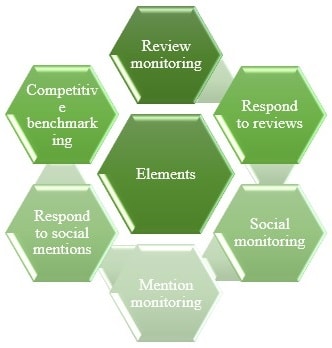Reputation management Assignment Help
Meaning of reputation management
Reputation management is also known as online reputation management refers to an attempt which is made by the organization in order to create the mindset of the organization in the public.
Elements of reputation management

The elements of reputation management or online reputation management include:
- Review monitoring
The review of the top websites like Facebook and yelp plays a very crucial and important role in building the reputation of the company. Reviewing and monitoring customer’s feedback on such business websites will help in getting the positive and negative feedback of the customers.
- Responding to reviews
Responding to the reviews of the customers also helps in building the online reputation of the company. When the company responds to the reviews of the customers it will help in maintaining the positive online presence. It’s the best way in which the company can engage itself with its customers. Thus, creating a good reputation for the company in the minds of the customers.
- Social monitoring
Social media monitoring is the best way to monitor the reviews of the customers about the brand and its various competitors. The audience or the customers give their valuable feedbacks on most of the social media sites like Instagram and Facebook. People sent approximately 500 tweets per day while engaging themselves with various brands.
- Mention monitoring
Mentioning of the brand-related monitoring can help in many different areas which include blogs, websites, forums, etc. It’s a very vital part of the reputation management strategy to help customers in tracking the full range of brand across the websites through brand mentions.
- Responding to social mentions
It is very important for a company to respond to social mentions in order to maintain its digital presence. It's very necessary to respond to the valuable feedback of their customers in order to manage the reputation of the brand and the organization. The feedback and opportunities are available online at every point in time and this should not be ignored.
- Competitive benchmarking
Competitive benchmarking helps in monitoring the performances of the competitors. This also helps in keeping the track of the activities and the online presence of the company and the brand.
Need for reputation management

There are various reasons which highlight the need for reputation management in the organization and these are as follows:
- Increase sales
Reputation management is required by the organization as it helps in increasing the sales of the organization. When the company is able to develop a good image in the minds of the consumers, then the sales will automatically increase. It helps the customer in differentiation the business from its competitors. If the brand is perceived as good by the consumer then it will definitely help in increasing the sales.
- Build trust and credibility
Building trust amongst the customers is very important and that is done with the help of reputation management. When the brand and organization has maintained its positive reputation in the minds of the customer, it helps in building trust and credibility. The customers who have built their trust in a particular brand are more likely to spread their experience amongst others. This will help in building the reputation of the company.
- Show the best side
It is very important to show the best side of the business to the clients and the customers because before doing business with any company, the prospects will do research about the business online and no one wants to do business with the company that has maintained the negative online reputation. So, the information about all the good things of the company must be highlighted online such that the customers will frame the positive mindset towards the brand.
- Online insights
Due to gossips, speculations, and rumors, even the good brands have destroyed their image and reputation. This all is the outcome of the wrong information that is floating about the brand online. The information that is available online is often leaked to the sources that are not good for the brand and reflects the brand as bad. So, maintaining the online insights about the brand plays a very crucial and vital role in maintaining the reputation of the company or the brand associated with it.
- Recruitment
In order to maintain a successful and effective workforce, it is very important to have a good online reputation. Today’s environment is very technologically advanced and everyone does online research before doing every small thing. So, when the company goes for recruiting the qualified and skilled professional into the organization they all go online and look for the reviews about the brand. The person would like to work with the organization if it has a good online reputation.
Reputation management Assignment Help By Online Tutoring and Guided Sessions from AssignmentHelp.Net
The process of reputation management

The process of reputation management is a five-stage process:
- Stage 1: Reputation research
The process of reputation management starts with the research. Research is conducted in order to remove or add the content that is available on the website which is not good for the reputation of the brand or the company. While doing the research, the company conducts the gap analysis which helps in finding out the results of the competitors with the results of the organization. The factors that influence the reputation are identified while conducting the research.
- Stage 2: Development
The second step in the process of reputation management is development. The development of the websites is very important as well as crucial part of the reputation management. As a part of reputation management, the business listings, social media profiles, maintenance of existing blogs, etc. play an important role and development of these is very necessary.
- Stage 3: Content
The next very important step in the process of reputation management is the content. The creation of good content for the website is very important as it helps in building the reputation of the brand. The development of good content includes a lot of brainstorming. The content must be very appealing to the target audience such that it can leave a positive impact on the minds of the customers. Content can include blog posts, social media posts, articles, press releases, etc. The good content helps in improving the rating and reviews of the brand online. Thus, building a good online reputation of the brand.
- Stage 4: Publishing
The next step that follows the development of the good content is the publishing of that content to the Search Engine Result Page (SERP) of the company. The plan is developed by the company in order to publish the contact on the Search Engine Result Page (SERP) of the company. The content is published in different forms by the organization which includes blog posts, social posts, articles, websites, videos, images, tweets, Facebook posts, slideshows, etc. Content may vary according to the needs of different projects.
- Stage 5: Promotion
The last step in the process of reputation management is the promotion of the branded search result that helps in maintaining the reputation of the brand. It is very necessary for the company to promote the brand along with the good content in order to see the fruits of the hard work and dedication.
Principles of effective reputation management

There are five principles of effective reputation management. These are as follows:
Manage risk
In order to implement effective reputation management systems, it is very important as well as necessary to manage the risks in the company. There are different types of risks that must be managed. The risks include:
- Design and quality risk- It is very mandatory for the organization to produce the goods that are of good quality and design. The process of designing the products must be assessed at every step in order to mitigate the risks associated with it such as individual
- Supply chain risk- As the industries are relying more on the contract manufacturers, the suppliers introduce greater risks. Such risks can be assessed and controlled so that an effective reputation management system can be implemented.
- Regulatory risk- There are high risks of regulatory gaps in the organization. There are many regulatory restrictions by the Government which the companies must comply to.
- Information security risk- In every organization there is a greater risk of information security and this risk must be mitigated to the maximum possible extent. Information security is a risk which prevails in every organization.
Be transparent
The consumers in today’s world make a lot of research before actually making the purchases. So, in order to manage its reputation, the organization must be purely transparent with its customers. The organizations must focus on various aspects of transparency like supply chain transparency in order to build a good image and reputation in the minds of the customers.
Create a strategic approach
A strategic approach to mergers and acquisitions must be created in order to implement effective reputation management systems. While conducting mergers and acquisitions in the organization, the reputation of the company must be well taken care of. In order to manage the reputation during mergers and acquisitions the company must:
- Identify the problems and the criticisms as well that are faced by them and should reply back to these problems very actively
- Communicate openly and with lots of transparency to the shareholders
- Avoid the disruptions and the mergers and acquisitions must take place from the perspective of the customer’s
- Be aware of the changes in the perception of the brands through the regular track of the online mentions of the company and make the strategies accordingly
Plan for the worst
The plan must be developed well in advance by the firms in order to face the worst situations and happenings in the company and to mitigate such a problem to the best possible extents. The plan must include the following strategies:
- Bowtie analysis is used to identify the rare and high-risk event and helps not only in preventing worst situations but also to recover from these situations.
- It should also have strategies such as creating a plan in order to communicate with the customers, stakeholders, and shareholders in the situation of crisis in the company.
- The integrated processes must be established in order to take the corrective steps as soon as possible so as to maintain the reputation and image of the company.
Be social media savvy
The companies must be social media savvy in order to implement effective reputation management systems. The sharing of social media platforms acts as a double-edged sword for the reputation of the company. Social media helps in giving instant replies to the reviews and feedback of their customers which results in customer satisfaction and maintains the reputation of the organization.
Advantages of reputation management
There are various advantages of maintaining a good online reputation and these are as follows:
- Trust
Trust of the customers is the biggest advantage of building a good online reputation. If a company has a good reputation in the market, then the people will definitely trust the brand and also becomes loyal to that particular brand. So, it is very necessary for the company to build a strong online reputation. Before making any purchase, consumers are more likely to do a lot of online research in order to ensure that the product is from a trustworthy and reputed brand. People trust the brand on the basis of the online reviews of the brand or the company given by various customers. So, it important to build a strong and positive online presence.
- Profitability
It is very much clear that the good online reputation brings more business into the company which helps in increasing productivity and as a result profitability increase. While searching the products online, people tend to make a comparison between the products of different competitors and likely to go for the product of the brand which has more positive reviews and a strong online presence. Profitability comes with trust. The more people will trust the brand, the more profitable it is. When the brand reflects a large number of positive reviews by the customers this will help in building the strong brand reputation and leads to more demand for the products of that brand. Thus, leads to an increase in the productivity and profitability of the business.
- Conflict resolution
The greatest advantage of having a strong reputation is conflict resolution. It is very important as well as crucial to respond to the negative as well as positive reviews of the customers in order to make them feel satisfied with the brand and helps in resolving the conflicts. If the conflicts are resolved as soon as possible then there are very fewer chances of fires. Responding to the negative reviews of the customers is another way to resolve the conflicts and maintain a good online reputation.
- Better customer interaction
Development of systems that provides easy access to the customers to interact with the company at any point in time brings customer satisfaction and leads to a strong online reputation of the company. The issues and concerns of the customers must be resolved very quickly so that they feel that the review of their customers matters to them a lot.
- Higher search rankings
SEO that is Search Engine Optimization helps in maintaining the good search ranks, but reputation management helps in keeping those search rankings intact with the company or the brand. It also helps in ensuring that the positive reviews, articles, and listings of the brand and the company appears among the top search results.
Disadvantages of reputation management
There are various disadvantages also that are there in building a strong online reputation. The disadvantages of reputation management are as follows:
- There is an overload of information while maintaining the online reputation of the brand or the company. There are a large number of messages and reviews of the customers which are very difficult to handle by the companies and as a result, there arises difficulty in building a strong brand reputation. This overload of information cause stress and panic amongst the employees.
- It becomes very difficult for the brand to collect information about every mention of the brand or the company even while using the various tools that are available in the market. The tools that are available do not provide a guarantee to find even the small mentions about the company.
- The engagement with the customers must be done very cautiously as every small mistake result in spoiling the reputation of the brand or the company. The proper guidance must be given to the staff related to how to handle the queries of the customers properly so as to make the customers satisfied with the brand.
- The online reputation management is of no use if the target audience is not active on social media and not using any such online platforms. This makes difficult for the brand to know the issues and concerns of their customers as the people are not using online platforms to express their major areas of
- Online comments and criticisms are not always helpful for the company or the brand in building a strong online reputation of the company.


